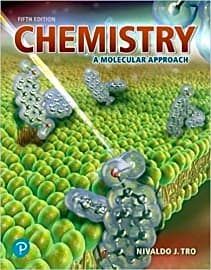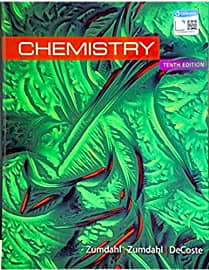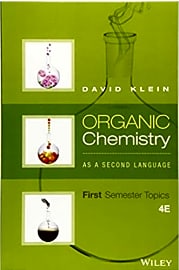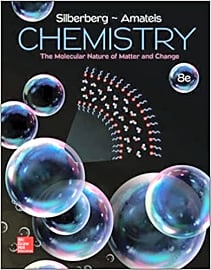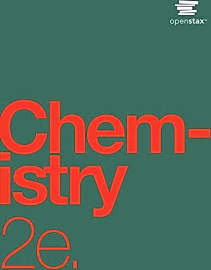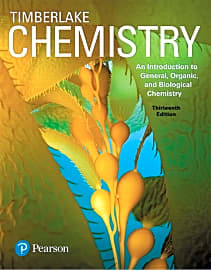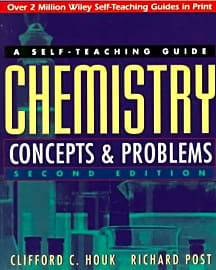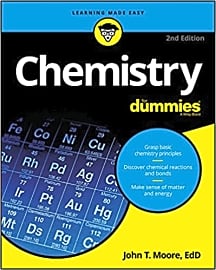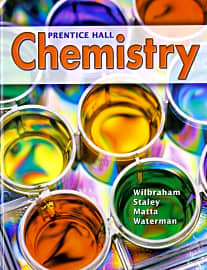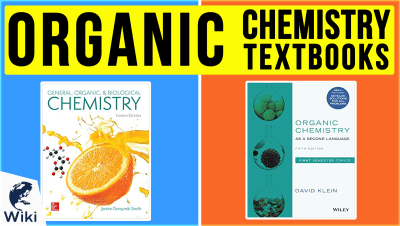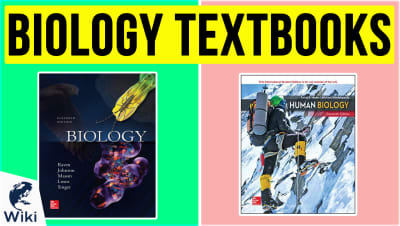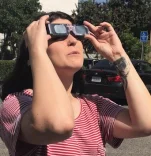The 10 Best Chemistry Textbooks


This wiki has been updated 35 times since it was first published in May of 2016. Besides being the gateway to understanding the building blocks of life, chemistry is a prerequisite for all kinds of careers, including pharmacists, chemical engineers, doctors, clinical biochemists, forensic scientists, and toxicologists, to name a few. These helpful textbooks can set anyone on the road to a rewarding profession, or just answer some interesting questions. When users buy our independently chosen editorial picks, we may earn commissions to help fund the Wiki.
Editor's Notes
July 16, 2020:
Not too much has changed in the world of chemistry textbooks since our last update, but as always, we ensured every selection was in its most recent version. That meant replacing Chemistry with Chemistry 2e by OpenStax. The editors recently made substantial improvements to the figures, illustrations, and example exercises that support the text narrative, and all changes are described in the preface to help instructors transition over to the new edition.
You'll find we kept the balance between introductory texts like Chemistry 10th Edition, Chemistry For Dummies, and Chemistry: Concepts and Problems and volumes suitable for the college-bound learner.
We said goodbye to Chemistry: The Science in Context, which, while rigorous and comprehensive, was gaining a reputation as needlessly confusing and frustrating to some students. We decided to bring on an organic chemistry textbook instead with Organic Chemistry As a Second Language. This one serves as an ideal primer for a student who's interested in this branch and wants to learn more before diving into an introductory course.
As a side note, Chemistry: The Molecular Nature of Matter and Change was only offered as a loose-leaf edition during our last update, but is now available in hardcover and ebook versions.
July 30, 2019:
Up until this point, this list had only seven entries, which we amended with the latest update. We added Chemistry: The Molecular Nature of Matter and Change, Chemistry 10th Edition, and Chemistry by OpenStax. All three of these texts are thorough, arranged with the student in mind, clearly explained, and packed with helpful pedagogical features.
Because OpenStax is a nonprofit organization, you can access their textbook for free online, however, we feel there's no substitute for having a physical book in hand to learn from. The print version is a great value for money considering its scope and length of well over a thousand pages.
We also brought Chemistry: A Molecular Approach up to date by supplementing the fourth edition with the newest fifth iteration. It is only available in looseleaf form as of our writing this.
All of the books on this list are written by experts, easy to digest, comprehensive, and use tools designed to make learning the material easier. Kinetic learners may want to consider pairing them with a molecular model kit to better broaden their understanding.
Special Honors
American Chemical Society Founded well over a century ago, The American Chemical Society, or ACS, is one of the world’s largest scientific organizations with more than 150,000 members in 140 countries. The organization works to advance chemistry and its practitioners to benefit the environment and improve lives. ACS is a leading publisher of authoritative scientific information and provides resources to members to elevate their career potential, expand their networks, inspire future generations, collaborate globally, and build communities that provide scientific solutions. acs.org
ChemCaper Geared toward high schoolers, yet still fun for adults, ChemCaper is an educational game that helps struggling students remember tricky concepts. Users will become familiar with the periodic table, bond elements, learn separation techniques and lab apparatus, and much more while solving puzzles and following an engrossing narrative arc buoyed by original music. chemcaper.com
Understanding The Basic Unit Of Chemistry
Atoms form every element on the periodic table, and collections of these atoms create the world around us.
Like in many other sciences, atoms are important in chemistry. Atoms are the basic units of matter, and they themselves consist of three things: protons, neutrons, and electrons. Protons carry a positive charge, electrons carry a negative charge, and neutrons have no charge. In the center of an atom lies a collection of protons and neutrons.
Orbiting this nucleus you will find the electron cloud. This is the interesting field where the electrons of an atom exist. New discoveries about the electron cloud are still being made in the modern era. For example, CERN, which is the European Organization for Nuclear Research, recently studied the electron cloud for its implications in experiments using proton colliders. The electron cloud itself is comprised of a number of orbits. The electrons in orbit around the atom are what allow atoms to interact with each other, linking up to create new bonds. A well known example is H2O, which is one oxygen atom linked to two hydrogen atoms. When these atoms connect, water is created. The interaction between atoms is called a bond.
There are a few types of bonds atoms can make, and these have a large effect on the type of compound created. The bonds are either covalent, ionic, or hydrogen bonds. Covalent bonds are very strong and are created when two atoms share electrons. Ionic bonds occur when two oppositely charged ions attract one another, such as the bond between sodium and chloride to make salt. Hydrogen bonds are weak and created by oppositely charged portions of covalent atoms. The classic example is bonds between water molecules.
During these interactions, atoms sometimes gain or lose an electron. This causes the atom to then gain or lose its negative charge. The resulting atom is called an ion. Positive ions occur when an atom loses an electron. This means more protons than electrons exist, and the resulting charge will be positive. When an atom gains an electron, the balance will shift towards having a negative charge. As an interesting note, negative ions have been studied for years for their benefits to the human body. Introducing negative ions into the environment is even associated with lower depression ratings in some people.
The foundation of chemistry, and much of the known universe, is the interplay between these particles and bonds. Atoms form every element on the periodic table, and collections of these atoms create the world around us. As such, understanding the basic unit of chemistry leads to understanding the basic unit of life itself.
Are Chemistry Textbooks Only For The Classroom?
While most textbooks will most likely find their use on a classroom desk in a lecture hall, this is not the only use for them. As humankind's thirst for knowledge grows, more people turn towards textbooks to acquire a thorough understanding of interesting fields.
The most notable area of expansion is in the realm of self-taught individuals.
The most notable area of expansion is in the realm of self-taught individuals. Due in part to the openness of the internet, more knowledge is available now than ever before. This has sparked a generation of educated individuals who seek to educate themselves outside of the university setting. This may also be influenced by the rising opinion that student debt is seen as a major barrier to knowledge by a large number of the student body.
For these self-taught individuals, clarity of information is key. In the student-teacher setting in most lecture halls, the lesson covering each section of the textbook usually helps to clarify any especially confusing aspects of the text, and helps to break down larger concepts. This leads to higher marks and a better understanding of the material. As this option is not available to people who are studying independently, having easily understood text is a high priority.
Luckily, many publishers understand the connotation that reading from textbooks may induce drowsiness, and actively seek to change that with their work. Many modern textbooks are actually written to be enjoyed by both the casual reader and student alike.
What Will A Chemistry Textbook Cover?
Chemistry can be complicated, and any chemistry textbook of note will need to cover the basics in an easily understandable format. Introductory chapters will usually help familiarize readers with the full metric system. This enables a universal understanding of measurements of various solids, liquids, and gasses.
After that, the subject of chemistry is often studied using a logical approach. The most basic concepts need to be covered before moving into complex subjects. Atoms, molecules, and bonds are studied first, usually followed by the study of the pH scale. This forms a basis of information that is vitally important to understanding any other concept in a chemistry textbook.
In general, chemistry is concerned with small scale organic and inorganic compounds, and physical versus biochemistry.
From there, the difference between organic and inorganic compounds will be studied, along with their various components. It is here that readers begin to learn about DNA, the familiar helix which makes up our genes. Genetic study allows us to understand more about humans and has even led to the human genome project. This was a complete mapping of all the genes in a human being. When the research was completed it revealed that there are probably about 20,500 different human genes, though a chemistry textbook will not cover them all.
The periodic table of elements will also be discussed. While it may not seem like much, the periodic table of elements represents every element known to man. As new elements are discovered with time, the periodic table is itself changeable, which is why it is good to keep your chemistry textbook up to date.
It is important to understand that chemistry textbooks will usually not discuss concepts of chemical engineering. In general, chemistry is concerned with small scale organic and inorganic compounds, and physical versus biochemistry. The study of chemical engineering will take you into many other disciplines. For instance, chemical engineers need to also understand concepts of physics and math. Chemistry will focus on developing new materials, testing theories, and analyzing processes. Chemical engineering focuses on taking these discoveries and observations and turning them into useful products. Understanding the difference between the two topics can help ensure you are purchasing the correct textbook.


